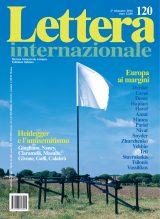
Ernest Gellner looks for the cause of some surprising developments in the twentieth century: the rising strength of Islam (in particular, Muslim fundamentalism); the upsurge in nationalism; and the unexpected and total collapse of Marxism. Behind both Muslim fundamentalism and nationalism, Gellner sees a break from local communities and hierarchies. And the main fault in Marxism, says Gellner, was the abolition of the profane. The big success stories today, he writes, “are the plural, liberal societies – what I call the unholy alliance of consumerist unbelievers.”

